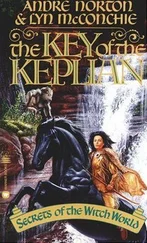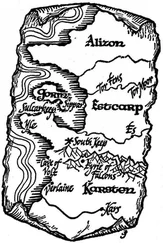Andre Norton - Three Against the Witch World
Здесь есть возможность читать онлайн «Andre Norton - Three Against the Witch World» весь текст электронной книги совершенно бесплатно (целиком полную версию без сокращений). В некоторых случаях можно слушать аудио, скачать через торрент в формате fb2 и присутствует краткое содержание. Жанр: Фэнтези, на английском языке. Описание произведения, (предисловие) а так же отзывы посетителей доступны на портале библиотеки ЛибКат.
- Название:Three Against the Witch World
- Автор:
- Жанр:
- Год:неизвестен
- ISBN:нет данных
- Рейтинг книги:5 / 5. Голосов: 1
-
Избранное:Добавить в избранное
- Отзывы:
-
Ваша оценка:
- 100
- 1
- 2
- 3
- 4
- 5
Three Against the Witch World: краткое содержание, описание и аннотация
Предлагаем к чтению аннотацию, описание, краткое содержание или предисловие (зависит от того, что написал сам автор книги «Three Against the Witch World»). Если вы не нашли необходимую информацию о книге — напишите в комментариях, мы постараемся отыскать её.
Three Against the Witch World — читать онлайн бесплатно полную книгу (весь текст) целиком
Ниже представлен текст книги, разбитый по страницам. Система сохранения места последней прочитанной страницы, позволяет с удобством читать онлайн бесплатно книгу «Three Against the Witch World», без необходимости каждый раз заново искать на чём Вы остановились. Поставьте закладку, и сможете в любой момент перейти на страницу, на которой закончили чтение.
Интервал:
Закладка:
But there was no reply for her. She rested the palm of her hand flat against my forehead, and stooped far over me so that her eyes looked directly into mine. Again from her lips came a low chant, and her actions drew out of me, mind and body, the rest of the wrenching nausea and terrible revulsion, leaving only the warning memory of what had happened and must never happen so again.
A measure of my energy restored, we went on. The open field had been security of a kind, but with night so close upon us we wanted shelter. Thus we followed the walls until we came to a small rise with on it a mound of stones, some of which still held together in an angle of what once might have been the corner of a building.
Together Kemoc and I worked to loosen more and build up a barricade before that triangular space while Kaththea roamed about the rise gathering sticks, and now and then breaking off a bit of growing thing. When she returned she was lighter of countenance.
“There is no rank smell here—rather, once there must have dwelt nearby one who followed the healing arts. Herbs will grow without tending, once they are well rooted. And look what I have found.” She spread out her harvest on top of a squared block of stone, “This”—one finger touched a slip of what could be fern—”is saxfage, which gives sweet sleep to the fevered. And this”—a stem with four trifid leaves—“langlorn, which brightens the mind and clears the senses. Best of all, which may be the reason that the other fair herbs have continued to grow—Illbane—Spirit Flower.”
That I knew of, since it was the old, old custom even in Estcarp to plant such about a doorway in spring, harvest its white flowers in the fall and dry them, to wreath above the main entrance to any house and stable. Such action brought good luck, prevented the entrance of ill fortune, and also had an older meaning—that any power of evil be baffled by its scent. For it was the nature of the plant that, picked or broken, its aromatic odor lingered for a long time.
Kaththea built a fire, laying her pieces with the care of one constructing a work of significance. When I would have protested such revealment of our presence, Kemoc shook his head, laying fingertip to lips in warning. Then, when she had her sticks laid, she crushed between her palms the saxfage and langlorn, working the mass into the midst of the wood. Last of all she carefully broke two blossoms from her spray of Illbane and added those also. Taking up the stem with its remaining tip cluster of flowers, she began to walk back and forth along our small barricade, brushing the stones we had set there with it, then planting the bruised spray among the rocks as a small banner.
“Light the fire,” she bade us. “It will not betray; rather, it will guard this night. For nothing which is truly of the dark will find in it, smoke and flame, that which it can face.”
So I set spark and the flames arose. The smoke was spiced with the smell of herbs. And shortly thereafter came another fine aroma as we toasted fresh meat on spits of wood. Perhaps Kaththea had indeed wrought strong magic, for I no longer felt that eyes saw, ears listened, that we were over-watched in this strange land.
VIII
WE SLEPT WELL that night, too deep for the troubling of dreams, to awake rested and clear-eyed, with only memory’s warning against what must walk here. But Kaththea must have awakened the first, for when I roused she knelt, her crossed arms on our barrier, gazing out into the morning land. There was no sun, only clouds prolonging the half-light of the early hours into the day.
She turned her head as I stirred. “Kyllan, what do you make of that?”
My gaze followed her pointing finger. There was a copse of trees some distance away and from beyond that a glow reached the sky. Not the red of fire flame, but a greenish radiance, which clearly was from no natural cause.
“It remains always the same, neither waning nor waxing.”
“A beacon of sorts?” I hazarded.
“Perhaps. But to summon—or to guide—what? I do not remember that we saw it last night. But I have listened and there is naught to hear.”
I knew that she had not listened with her ears, but with her seer-trained inner sense.
“Kaththea—”
She turned her head to look at me.
“This land may be full of such traps as I blundered into. There may be good reason why it was closed and is closed to those of our mother’s blood.”
“All that is true. Yet it has come to me that there was a purpose beyond our own wills guiding us here, Kyllan. Save for such plague spots as you found, this is a fair land. Look about you. Even under the shadow of the clouds, do you not find it in you to have a liking for these fields?”
She was right. There was an odd drawing in me, a desire to walk those ancient, overgrown fields, even to thrust my hands deep into their waiting soil. I wanted to fling off the heaviness of helm and mail, to run joyously free and unburdened, with the wind about me and a fresh land under my feet. I had not felt so since I had been a small boy already under the hammer of Otkell’s discipline.
Kaththea nodded. “You see? Can you turn your back on all this merely because it suffers from some disease? We can beware of the places of evil, and make the best of those of good. I tell you such herbs as I harvested last night cannot grow where all is befouled by the Powers of the Dark.”
“No matter how fair a land,” Kemoc said from behind us, “a man must have two things—a shelter and a supply of food. I do not believe this is what we want for a home roof-tree or hall. And for awhile we must turn hunters for food. Also, I would like to know a little more of our neighbors.”
With that I agreed. It is always best to be sure that any shadow pooled behind a tree is only shadow and not sheltering some unpleasant surprise.
We ate more of the meat and drank the tart vine fruit, and then we prepared to journey on. Though before Kaththea left the hill she again plucked a selection of herbs, bagging them in a strip torn from the hem of her robe, which she now proceeded to shorten to only slightly below knee length.
The gleam, still faintly visible because of the clouds, drew us. But we went warily, taking to the cover of the woods. Kaththea reported no troublesome scents and the small copse seemed normal with birds and other wild life. This woods was not too wide and finally we reached a fringe of brush on its far side. Here again was open country and through it wound the river. In a curve of that stream stood the first real structure we had seen this side of the mountains. And it was familiar in shape—one of the watchtower-guard-keeps, such as we had been housed in many times in Estcarp. From the slit windows of the third and fourth levels issued the light, and more was diffused from the crown, where were the only evidence of age, a few stones missing from parapet gaps.
Looking upon it I had not the slightest desire to explore further. It had not met us with an active slap of evil such as I had met in the stone web . . . but there was an eerie sense of withdrawal, a signpost without words to ward off the coming of men. Whatever walked there might not be actively antagonistic to our species, but neither would we be welcomed by it. As to how I knew this, I cannot explain. But Kemoc agreed with me.
Kaththea centered upon it her “seeing,” then shook her head. “There is no penetration of mind, and I would not try in body. Let be what lies there, if anything does. There are and have always been forces which are not actively good or evil—they can kill or cure. But to meddle with them is risky; it is best not to awaken them.”
Still I had a distaste for being observed by anything or anyone manning that post. The others agreed to slip back into the wood and circle under its cover to the river. We kept downstream from the site of the pillar web, Kaththea sniffing the wind for any warning of ill.
Читать дальшеИнтервал:
Закладка:
Похожие книги на «Three Against the Witch World»
Представляем Вашему вниманию похожие книги на «Three Against the Witch World» списком для выбора. Мы отобрали схожую по названию и смыслу литературу в надежде предоставить читателям больше вариантов отыскать новые, интересные, ещё непрочитанные произведения.
Обсуждение, отзывы о книге «Three Against the Witch World» и просто собственные мнения читателей. Оставьте ваши комментарии, напишите, что Вы думаете о произведении, его смысле или главных героях. Укажите что конкретно понравилось, а что нет, и почему Вы так считаете.









